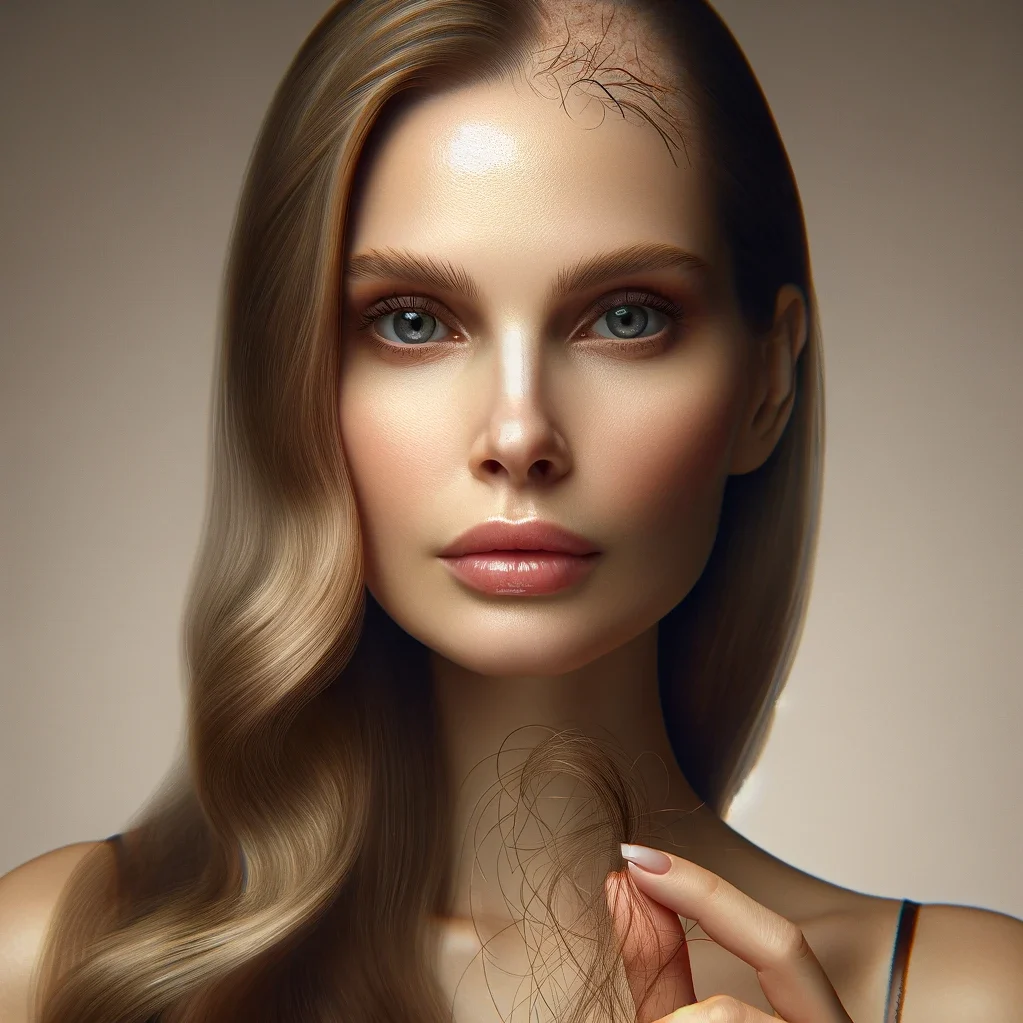Hair loss is a common problem that can be caused by hormonal imbalances. While there are various treatment options available, many people prefer to manage hormonal hair loss naturally. This section will provide tips and techniques for naturally preventing and treating hormonal hair loss based on factual data from reputable sources.
When it comes to hormonal hair loss, finding natural remedies can be an effective and satisfying approach. By incorporating these natural methods into your routine, you can support the health of your hair and potentially slow down or prevent further hair loss.
Key Takeaways:
- Scalp massage and essential oils, such as coconut oil and rosemary oil, can promote hair growth and improve scalp health.
- Natural supplements like Viviscal, fish oil, and ginseng can support hair growth and combat hormonal imbalances.
- Adopting a healthy diet, practicing good hair care habits, and managing stress levels can contribute to overall hair health.
- Light therapy and various medical treatments can also be effective options for managing hormonal hair loss.
- It is important to seek professional help if natural remedies do not provide satisfactory results or if hair loss is excessive or persistent.
Scalp Massage and Essential Oils
Massaging the scalp with hair oils and masks stimulates the scalp, improves blood flow, and may improve hair thickness. A 2019 study showed that scalp massaging improved hair growth and scalp health.
The Benefits of Scalp Massage
Scalp massage has been used for centuries as a natural remedy for hair loss. When done correctly, it can increase circulation to the hair follicles, delivering essential nutrients and oxygen for optimal hair growth. Additionally, scalp massage can help relax the scalp and reduce stress, which has been linked to hair loss.
One of the key benefits of scalp massage is its ability to stimulate the sebaceous glands, which are responsible for producing oil that moisturizes the scalp and promotes healthy hair growth. By increasing circulation and stimulating these glands, scalp massage can improve the overall health and condition of the scalp, leading to stronger, thicker hair.
Essential Oils for Hair Growth
Essential oils are concentrated plant extracts that have been used for various purposes, including promoting hair growth. When applied to the scalp, certain essential oils can nourish the hair follicles, improve scalp health, and stimulate hair growth.
Here are some beneficial essential oils for hair growth:
- Coconut oil: Coconut oil is rich in lauric acid, which can penetrate the hair shaft and reduce protein loss, preventing breakage and promoting hair growth.
- Aloe vera: Aloe vera has soothing and moisturizing properties that can help reduce scalp inflammation and promote hair growth.
- Rosemary oil: Rosemary oil has been shown to increase hair thickness and stimulate hair growth by improving blood circulation to the scalp.
- Onion juice: Onion juice contains sulfur, which can strengthen the hair follicles, reduce hair breakage, and promote regrowth.
- Lemon oil: Lemon oil can help regulate oil production on the scalp, reduce dandruff, and improve hair growth.
To use essential oils for hair growth, mix a few drops of the chosen oil with a carrier oil, such as coconut or olive oil, and gently massage it into the scalp. Leave it on for at least 30 minutes or overnight before rinsing it out.
Remember, essential oils are highly concentrated and should always be diluted before application to avoid skin irritation. It’s also important to patch test a small area of the scalp to check for any allergic reactions before using essential oils extensively.
In addition to promoting hair growth, some essential oils can also help reduce dandruff, prevent scalp infections, and promote a sense of relaxation.
“Scalp massage and the use of essential oils can be effective natural remedies for hair loss, stimulating hair growth and enhancing scalp health.” – Hair Care Specialist
Adding scalp massage and essential oils to your hair care routine can provide a natural and enjoyable way to support hair growth and improve overall hair health. However, it’s important to remember that results may vary depending on individual factors and the extent of hair loss.
Natural Hair Growth Supplements
Natural supplements can be a valuable addition to your hair care routine, aiding in the promotion of hair growth and preventing hair loss. In this section, we’ll explore some popular natural supplements that have shown promising results in supporting healthy hair.
Viviscal
One highly regarded hair growth supplement is Viviscal. This natural supplement contains a blend of minerals, vitamins, and organic silica that work together to stimulate hair regeneration and strengthen existing hair cells. Viviscal nourishes the hair follicles from within, promoting thicker, fuller, and healthier hair.
Fish Oil
Another beneficial supplement for hair growth is fish oil. Rich in essential fatty acids and antioxidants, fish oil provides the necessary nutrients to support hair density and growth. These nutrients help nourish the hair follicles, strengthen the hair shaft, and promote overall hair health.
Ginseng
Ginseng is a natural supplement that may have stimulating effects on hair follicles, making it an excellent choice for promoting hair growth. It works by increasing blood circulation to the scalp, which helps deliver essential nutrients to the hair follicles. This improved blood flow can contribute to stronger and healthier hair.
When considering natural supplements for hair growth, it’s important to choose high-quality products from reputable brands. Additionally, consult with a healthcare professional before starting any new supplement regimen, especially if you have any underlying health conditions or are taking medication.

Using natural hair growth supplements in combination with a healthy lifestyle, proper hair care, and other effective natural remedies can help maximize your chances of achieving strong, beautiful hair. While results may vary for each individual, incorporating these supplements into your routine can support your hair health journey.
Hormone Balancing
Hormonal imbalances can have a significant impact on hair health, particularly in women. When the hormonal equilibrium is disrupted, it can lead to hair loss and thinning. However, there are steps you can take to balance your hormones naturally, which can help in managing hormonal hair loss.
First and foremost, adopting a healthy lifestyle is crucial. Proper nutrition plays a vital role in hormone regulation, so focus on consuming a well-balanced diet rich in essential nutrients. Incorporate plenty of fruits, vegetables, lean proteins, and healthy fats into your meals to support hormonal balance and overall hair health.
In addition to a healthy diet, regular exercise can also contribute to hormone balance by reducing stress and promoting optimal hormone production. Engaging in physical activity for at least 30 minutes a day can go a long way in managing hormonal hair loss.
Speaking of stress, it’s essential to find effective ways to manage and reduce stress levels. High-stress levels can disrupt hormone levels and contribute to hair loss. Consider incorporating stress-relieving practices into your daily routine, such as meditation, deep breathing exercises, or participating in activities you enjoy.
Adequate sleep is another crucial factor in hormone regulation. Aim for 7-8 hours of quality sleep each night to support healthy hormone production and reduce the risk of hair loss.
While lifestyle changes are beneficial, some women may require additional hormonal support to manage hair loss effectively. Hormone replacement therapy (HRT) is a treatment option that involves replacing deficient hormones in the body to restore balance. This therapy is commonly used to treat menopausal symptoms but can also be useful for managing hormonal hair loss. Antiandrogen medications can also be prescribed to inhibit the effects of androgens, which can contribute to hair loss.
To determine the most appropriate treatment options for your individual situation, consult with a healthcare professional who specializes in hormone therapy for hair loss. They will assess your hormone levels and develop a personalized treatment plan tailored to your specific needs.
Remember, managing hormonal hair loss is a comprehensive process that involves various strategies. By adopting a healthy lifestyle, reducing stress, and seeking professional guidance when needed, you can take proactive steps towards hormone balance and healthier hair.
“Hormone balance is crucial for maintaining healthy hair. Through lifestyle changes and, if necessary, hormone replacement therapy, we can effectively manage hormonal hair loss and ensure optimal hair health.”
| Treatment Option | Description |
|---|---|
| Hormone Replacement Therapy (HRT) | HRT involves replacing deficient hormones in the body to restore balance and is commonly used to treat menopausal symptoms. It can also help manage hormonal hair loss. |
| Antiandrogen Medications | These medications inhibit the effects of androgens, the hormones that can contribute to hair loss. |
Nutritious Diet and Natural Hair Care
A nutritious diet is essential for maintaining healthy hair. By consuming a variety of fruits, vegetables, proteins, and healthy fats, we can provide our bodies with the necessary nutrients to promote hair health and growth. Additionally, practicing good hair care habits plays a significant role in preventing hair damage and breakage.
To keep our hair healthy and strong, it is important to:
- Avoid heat styling tools: Excessive heat can lead to hair dryness, brittleness, and breakage. Minimize the use of blow dryers, straighteners, and curling irons. If you must use heat styling tools, apply a heat protectant spray beforehand and use the lowest heat setting possible.
- Minimize chemical treatments: Chemical treatments such as hair dyes, relaxers, and perms can weaken the hair shaft and make it prone to breakage. Limit the use of these treatments to preserve the health and integrity of your hair.
- Use gentle shampoos and conditioners: Harsh chemical-laden shampoos and conditioners can strip the hair of its natural oils and cause dryness and damage. Opt for mild, sulfate-free products that are suitable for your hair type and texture.
By incorporating these natural hair care tips into our routine and maintaining a healthy diet, we can enhance the overall health and appearance of our hair.

| Food Group | Recommended Foods | Benefits |
|---|---|---|
| Fruits | Berries, citrus fruits, avocados | Provide antioxidants and vitamin C, which promote hair health and protect against oxidative stress. |
| Vegetables | Leafy greens, carrots, sweet potatoes | Rich in vitamins A and C, which support hair growth and maintain scalp health. |
| Proteins | Lean meats, fish, legumes | Supply essential amino acids that are the building blocks of hair proteins, promoting hair growth and strength. |
| Healthy Fats | Avocados, nuts, seeds | Contain omega-3 fatty acids and vitamin E, promoting scalp health and improving hair texture and shine. |
Light Therapy and Hair Loss Treatments
Light therapy, particularly low-level light therapy, has shown promising results in promoting hair growth and improving the effectiveness of other hair loss treatments. This therapy involves exposing the scalp to specific wavelengths of light to stimulate hair follicles and increase blood flow.
One study conducted in 2020 found that low-level light therapy resulted in significant hair regrowth in individuals with androgenetic alopecia, a common form of hair loss. The therapy not only stimulated hair follicles but also enhanced the absorption of topical hair loss treatments.
Light therapy devices are available for at-home use and can be a convenient option for individuals seeking hair loss treatment in the comfort of their own homes. These devices emit red or near-infrared light, which is believed to enhance cell activity and stimulate hair growth.
In addition to light therapy, there are various other treatment options available for managing hormonal hair loss. These options include:
- Topical medications: Minoxidil, an FDA-approved topical medication, can effectively promote hair growth and reduce hair loss. It is available over-the-counter and can be applied directly to the scalp.
- Ketoconazole shampoo: Ketoconazole is an antifungal shampoo that may help reduce inflammation and improve hair density. It can be used in conjunction with other hair loss treatments.
- Corticosteroid injections: In severe cases of hair loss, corticosteroid injections may be recommended. These injections are administered directly into the scalp to reduce inflammation and promote hair regrowth.
- Platelet-rich plasma (PRP) therapy: PRP therapy involves injecting a concentrated solution of platelets into the scalp to stimulate hair follicles and promote hair growth.
It is important to consult with a healthcare professional or a hair loss specialist to determine the most suitable treatment option based on individual needs and the severity of hair loss.
When to Seek Professional Help
While natural remedies can be effective in managing hormonal hair loss, there are instances where it is crucial to seek professional help. Recognizing when to consult a doctor or specialist is essential for diagnosing the underlying cause of hair loss and receiving appropriate medical treatments.
If you experience excessive hair loss, accompanied by other concerning symptoms such as scalp redness, itching, or pain, it is advisable to schedule an appointment with a healthcare professional. Persistent hair loss despite trying natural treatments may also indicate the need for medical intervention.
A doctor specializing in hair loss can perform a thorough examination and diagnostic tests to determine the root cause of your hair loss. They may recommend medical treatments tailored to your specific condition and needs. These treatments can range from prescription medications to specially formulated shampoos or even hair transplantation procedures.
| When to See a Doctor for Hair Loss | Medical Treatments for Hair Loss |
|---|---|
| – Excessive hair loss | – Prescription medications |
| – Scalp redness, itching, or pain | – Specially formulated shampoos |
| – Persistent hair loss despite natural remedies | – Hair transplantation procedures |
By seeking professional help, you can receive expert guidance, accurate diagnosis, and access to medical treatments that may effectively address your hormonal hair loss. Remember, each individual’s experience with hair loss is unique, and a personalized approach is crucial in finding the most suitable solution for your particular case.
Conclusion
Managing hormonal hair loss naturally requires a comprehensive approach that encompasses lifestyle modifications, natural remedies, and proper hair care. By implementing these tips and techniques, individuals can proactively address the underlying hormonal imbalances that contribute to hair loss. However, it is important to note that the effectiveness of these methods may vary from person to person, as each individual’s experience with hair loss is unique.
While natural solutions for hair loss can yield positive results for many, it is crucial to recognize that not all cases of hormonal hair loss can be effectively managed through these means alone. If natural methods fail to provide satisfactory results or if hair loss persists or worsens, it is recommended to seek professional advice from a healthcare provider or a qualified hair loss specialist.
Remember, taking a holistic approach to managing hormonal hair loss involves understanding and addressing the underlying causes, adopting healthy lifestyle habits, utilizing natural remedies, and seeking appropriate medical intervention when necessary. With diligence and patience, it is possible to effectively manage hormonal hair loss and maintain healthy, vibrant hair.
FAQ
How can I manage hormonal hair loss naturally?
There are several natural remedies and lifestyle changes that can help manage hormonal hair loss. These include scalp massage, using essential oils, taking natural hair growth supplements, balancing hormones through diet and exercise, practicing good hair care habits, and considering light therapy and other hair loss treatments.
Can scalp massage help with hair loss?
Yes, scalp massage can be beneficial for hair loss. It stimulates the scalp, improves blood flow, and may improve hair thickness. Massage your scalp with hair oils or masks, such as coconut oil, aloe vera, rosemary oil, onion juice, or lemon oil, to nourish and stimulate the hair follicles.
Are there any natural supplements that can promote hair growth?
Yes, natural supplements can support hair growth and prevent hair loss. Viviscal is a popular supplement that promotes hair regeneration and strengthens existing hair cells. Fish oil, which provides essential fatty acids and antioxidants, and ginseng, which may stimulate hair follicles, are other supplements that may be beneficial.
Can hormone balancing help with hair loss?
Hormonal imbalances can contribute to hair loss, especially in women. Balancing hormones through lifestyle changes and natural remedies can help manage hormonal hair loss. This may include adopting a healthy diet, exercising regularly, reducing stress levels, and getting enough sleep. Some women may also benefit from hormone replacement therapy or the use of antiandrogen medications.
How does diet affect hair health?
A nutritious diet plays a crucial role in maintaining healthy hair. Consuming a variety of fruits, vegetables, proteins, and healthy fats provides essential nutrients that promote hair health and growth. It is important to avoid excessive heat styling tools, minimize chemical treatments, and use gentle shampoos and conditioners to prevent hair damage and breakage.
Are there any treatments available for hair loss?
Yes, there are various treatment options available for managing hormonal hair loss. These include light therapy, topical medications like minoxidil and ketoconazole shampoo, corticosteroid injections, and platelet-rich plasma therapy. These treatments can stimulate hair growth, improve hair density, and strengthen existing hair.
When should I seek professional help for hair loss?
If hair loss is excessive, accompanied by other symptoms, or persists despite natural treatments, it is advisable to consult a healthcare professional. They can diagnose the underlying cause of hair loss and recommend appropriate medical treatments such as prescription medications, specially formulated shampoos, or hair transplantation procedures.
What is the importance of managing hormonal hair loss naturally?
Managing hormonal hair loss naturally is a holistic approach that combines lifestyle changes, natural remedies, and proper hair care. By implementing these tips, individuals can work towards preventing hair loss, promoting hair growth, and maintaining healthy hair. If natural methods do not provide satisfactory results, seeking professional advice is recommended.


1 thought on “Tips for Managing Hormonal Hair Loss Naturally”